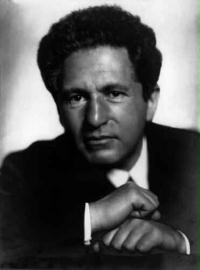Karl Weigl

(6 February 1881 – 11 August 1949) was an Austrian composer.
String Quartet No. 1 (1904)
I. Allegro Con Fuoco - 00:00
II. Adagio - 10:29
III. Wild und bacchantisch - 22:28
IV. Andante Moderato - 34:22
He was born in Vienna, being the son of a bank official who was also a keen amateur musician. Alexander Zemlinsky took him as a private pupil in 1896. Weigl went to school at the Franz-Joseph-Gymnasium and graduated from there in 1899. After that, he continued his studies at the Vienna Music Academy, where he became a composition pupil of Robert Fuchs, and also enrolled at the University of Vienna, studying musicology under Guido Adler, having Anton Webern as a classmate. His only opera, Der Rattenfänger von Hameln, premiered in Vienna in 1932.
When the Nazis occupied Austria, in 1938, Weigl emigrated to the United States of America, together with his second wife, musician and composer Vally Weigl (née Pick), and his son. There, he obtained a number of increasingly important teaching posts: at the Hartt School of Music, at Brooklyn College, at the Boston Conservatory and, from 1948 on, at the Philadelphia Academy of Music.
He died in New York after a prolonged battle with bone marrow cancer.
Weigl wrote many compositions including symphonies, chamber music pieces including string quartets,
and songs for solo piano.[영어위키]
------------------------------------------------------------------------------------------------
Karl Weigl's music was championed by the likes of Gustav Mahler, Richard Strauss, Bruno Walter, Arnold Schoenberg, Pablo Casals and many others and up until the Second World War, he was recognized as one of the most important living composers. Yet, despite the high regard of his contemporaries, Weigl immediately plunged into obscurity barely able to make ends meet when, in 1938, he fled his native Austria and emigrated to the United States.
Eventually, he secured a teaching post at the Hart School of Music and later served as head of the theory department at the New England Conservatory. In no small part, the Second World War permanently swept away what had, up until then, been a prominent European, if not international, reputation. In the German-speaking world, his compositions were amongst the most performed of all 20th century composers.
Karl Weigl (1881-1949) was educated at the University of Vienna and the Conservatory of the Gesellschaft der Musikfreunde. He also studied with Alexander Zemlinsky, who was a family friend. Although he never abandoned writing tonal compositions and did not believe in the twelve tone system, Weigl nevertheless became friends with both Webern and Schönberg.
In 1903, the three of them founded the Vereingung schaffender Tonkünstler which dedicated itself to presenting concerts of important modern works including those of Mahler, Richard Strauss, Reger, Pfitzner, Schönberg, Zemlinsky and Weigl. Mahler, when director of the Vienna Court Opera, engaged Weigl as his rehearsal conductor. There, he coached such legendary singers as Leo Slezak, Lotte Lehmann and Selma Kurtz. Throughout this period up until the outbreak of WWI, Weigl worked diligently composing works in many genres.
"I can warmly recommend Karl Weigl's String Quartet in c minor, Op.20 which received its first performance in 1925 (though it was composed in 1904). It is an outstanding and captivating work, the thematic material to which is all closely related. It is a modern work but without eccentricities of tonality and which retains traditional harmony despite some very original uses.
The main theme of the opening movement, Stürmisch bewegt, is full of pathos. Of particular note is the voice leading between the melody in the cello and later viola and the syncopated accompaniment. A lovely, calmer second subject provides a very effective contrast.
The main theme of the second movement, Adagio, is quite atmospheric while the middle section, characterized by a sense of struggle, is quite telling.
The third movement, Wild und bacchantisch, is a furious scherzo, the trio to which is a tonally gorgeous and lovely Adagio.
A superb finale, Andante moderato, with its deeply religious mood crowns this quartet"
---Wilhelm Altmann, writing in his Handbook for String Quartet Players[유튜브]
'♣ 음악 감상실 ♣ > - 4중주(QUARET)' 카테고리의 다른 글
| Karl Goldmark-:String Quartet in B flat major ,Op.8(1860) (0) | 2016.10.25 |
|---|---|
| Pēteris Vasks "Quartet for Violin, Viola, Cello, Piano" (0) | 2016.10.04 |
| Ambroise Thomas - String quartet in E-minor, Op.1 (1833) (0) | 2016.09.18 |
| Elfrida Andrée- Klavierquartett a-Moll (0) | 2016.09.17 |
| Dora Pejačević - Piano Quartet in D minor, Op. 25 (0) | 2016.09.16 |